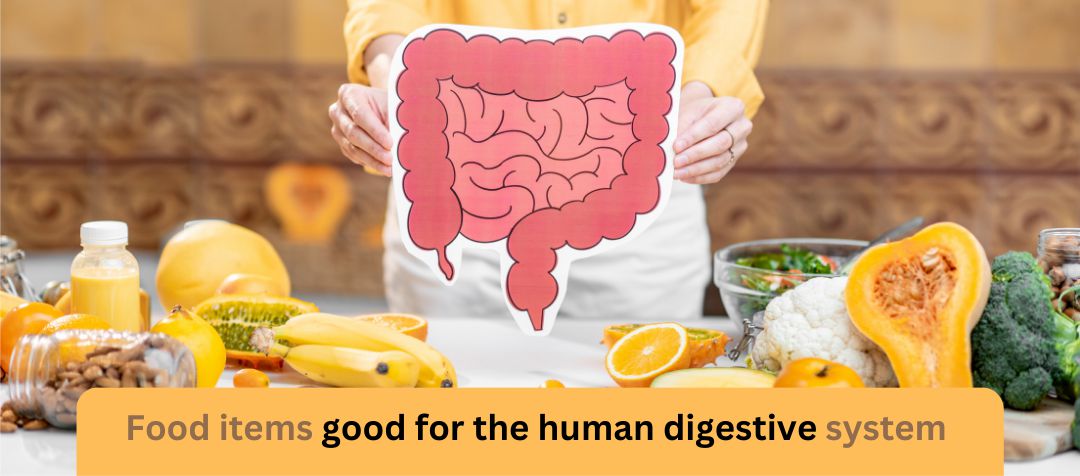Since our digestive system is our responsibility, we have to take some responsible decisions to keep it happy and healthy. No matter how occupied we may be, the stomach has to come first. In case you are wondering how to do that, worry not. You are at the right spot. We are going to take you through the top 10 food items which are super healthy for the human digestive system. So, keep reading.
- PAPAYA
Yey! You know this one. This luscious fruit encompasses a digestive enzyme called papain. It assists us in our digestive process by breaking down protein fibers. While we may believe that it is not required in our diet yet in many cases it has been proven to aid in the digestion of protein. In certain cases, papain may also ease symptoms of irritable bowel syndrome (IBS), such as constipation and bloating.
Fun fact – This fruit is commonly used as the main enzyme in digestive supplements due to its gastrointestinal capacities.
- YOGURT

For the ones who don’t know what yogurt is, here is a brief – Yogurt is made from milk that is fermented, typically by lactic acid bacteria. It has to be a part of our diet as it contains friendly bacteria known as probiotics. These bacteria live in our digestive tract and help improve digestion, to keep our gut healthy. Even though probiotics naturally occur in our gut, boosting our intake through foods like yogurt can ease digestion, and help with bloating, constipation and diarrhea.
One healthy tip – Understand that not all yogurt contains probiotics. Therefore, while shopping, be sure to check for “live and active cultures” on the package.
- APPLES – “One apple a day keeps the doctor away.”
Ever wondered why that might be the case? It is because apples are a rich source of pectin, a soluble fiber. The way this fiber works is no less than a miracle in itself – it increases our stool volume and is therefore commonly used to resolve constipation and diarrhea. You won’t believe but it has also been shown to decrease the risk of intestinal infections and inflammation in the colon. Isn’t that amazing? Now you know why you can’t just skip apples.
- WHOLE GRAINS
These grains are the seeds of grasslike plants called cereals. It is classified as a whole grain only when it contains 100% of the kernel along with the bran, germ, and endosperm. Some of the popular examples of the same are – oats, quinoa, and farro.
How is it helpful to our digestive system? It is the fiber found in these grains which helps improve digestion in two ways. Firstly, fiber helps by adding bulk to our stool which reduces constipation. Secondly, some grain fibers act like prebiotics to help feed healthy bacteria in our gut.
- FENNEL
What is Fennel? It is basically a plant with a pale bulb and long green stalks.
Why is it used? Simply to add flavor to food.
Why is it important? It is important because its fiber content helps us to prevent constipation and improve regularity in our digestive tract. Additionally, fennel also contains an antispasmodic agent that relaxes the muscles in our digestive tract. Especially for our ladies, this is a game changer as consuming it can reduce negative digestive symptoms like bloating, flatulence, and cramping. Now isn’t that another good news to celebrate?
- KEFIR
Let’s start by getting to know what kefir is. In simple terms, it is a cultured dairy product that is made by adding kefir “grains” to milk. Just like the probiotics in yogurt aid in the digestion of lactose, and decrease some of the negative side effects associated with lactose intolerance such as bloating, cramping, and gas, ‘kefir grains in milk’ do the same. As per multiple studies conducted in this field, it has also been realized that it also favors a drop in harmful bacteria thereby decreasing the inflammation in our gut.
- CHIA SEEDS
These are excellent sources of fiber which helps promote bowel regularity and healthy stools. Once we consume these, they form a gelatin-like substance in our stomachs. Apart from this, they also work like a prebiotic to support the growth of healthy bacteria in our gut and therein contribute to healthy digestion.
- BEETS
Beetroot, commonly known as beets, is a good source of fiber. Even if we take as less as one cup (136 grams) of beets, it shall contain 3.4 grams of fiber. The beauty of this fiber is that it bypasses digestion and heads to our colon, where it feeds our healthy gut bacteria or adds bulk to our stool. For fun and to experiment with the taste, people have even resorted to roasting, mixing it in a salad, or blending it into a smoothie.
- GINGER
Now, who, in India, doesn’t know that Ginger is good for the stomach? It is a traditional ingredient in Eastern medicine that helps improve digestion and prevent nausea. So much so that many pregnant women even use it to treat their morning sickness. From the standpoint of digestion, this yellowish root assists by accelerating gastric emptying. How? It does so by moving food from our stomach to our small intestine more rapidly. Ginger even reduces our risk of heartburn, nausea, and stomach discomfort.
- DARK GREEN VEGETABLES
We are 100% certain that once in a while, your parents would have certainly asked you to consume as many green veggies as possible. Well, here is why – Green vegetables are an excellent source of insoluble fiber which adds bulk to our stool, and quickens its pace through your digestive tract. Not just that, green veggies are also a good source of magnesium, which can help relieve constipation by improving muscle contractions in our gastrointestinal tract.
What are some of the best green options? Well, you can always opt for Spinach, brussels sprouts, and broccoli.
The Bottom Line
If you feel that you don’t have time enough to introduce these food items then you may consider introducing yourself to an ayurvedic remedy, by the name of Petsaffa granules and tablets. You can take 1 to 1½ teaspoons (3gm to 6gm) of these tablets or granules for digestion with one glass of lukewarm water (approx. 200ml) at bedtime. Since it contains Haritaki as one of its ingredients, it promotes a healthy bowel movement, detoxifies the gut, improves digestion, strengthens vision, reduces the effects of aging, and also fights respiratory diseases.
We understand that digestive issues can be challenging, but a regular intake of these food items can certainly come in handy to ease uncomfortable symptoms. These are even backed by numerous researchers who support eating fermented foods, such as yogurt, kimchi, and tempeh, to increase probiotics in our diet. Fiber-rich foods (the ones we discussed above) also play a role in digestion by helping food move through our system more easily or quickly. If you are also struggling and seeking relief from your digestive woes, do consider adding some of these 10 foods to your diet.
FREQUENTLY ASKED QUESTIONS
Q. What is Pet Saffa?
Pet Saffa is a natural laxative that provides effective relief from constipation and its related problems. It is an Ayurvedic proprietary medicine that is made of the perfect combination of natural herbs such as Senna, Ajwain, Kala Namak, Sendha Namak, Kalimirch, Nisoth, Svarjiksara, Saunf, and others. These herbs work in unison to improve digestion, increase appetite and help regulate bowel movements and soften hard stools.
Q. In what forms is Petsaffa available?
This laxative is available in the form of granules and tablets.
Q. How do we take these laxatives?
Simply take 1 to 1½ teaspoons (3gm to 6gm) of Pet Saffa Natural Laxative Granules with one glass of lukewarm water (approx.200ml) at bedtime.
Q. What is the side effect of taking these granules?
Since both Pet Saffa Granules and Tablets are made of natural herbs, therefore are completely safe to use.
Q. What is the most effective time to take it?
Your bedtime is single-handedly the most effective time.
Q. From where to shop for Pet Saffa Granules and tablets?
Without any hassle, you can purchase it from your nearest medical store all over India. In addition to this, you can also order Pet Saffa online from Divisa Store, Amazon, and Flipkart.





